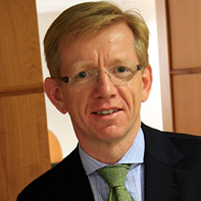Reimagining the Library

Entrance to Hunt Library, Pittsburgh Campus

Keith Webster
The world of the research library has been transformed in recent years. While the library continues to serve as the laboratory for many in the humanities and social sciences, in almost every field, students and researchers want the information they need delivered to their desktops, and increasingly to their mobile devices, wherever they are and whenever they want it. Libraries remain busy destinations, but students use them in very different ways from their predecessors.
That is posing a number of serious challenges for libraries.
Enter Keith Webster, the new Dean of Libraries at Carnegie Mellon University. He has a compelling vision for the future as he seeks to reinforce the library's role as a vital part of learning.
"We have valuable real estate occupied by material that is rarely, if ever, used," said Webster, formerly dean of libraries and university librarian at the University of Queensland in Australia, one of the largest libraries in the southern hemisphere. "The library remains a prominent feature in students' lives, although their use of conventional library collections and services diminishes each year."
Research Webster conducted within the last five years at University of Queensland Library shows almost 60 percent of students visit a library each day — with around half staying for between thirty minutes and two hours. A quarter of the students spend more than two hours daily in the library. What are they doing? Interacting with technology, information and each other as they prepare term papers, study for exams and work on group assignments.
So what does all this mean for the future of the libraries? Will the big buildings still exist ten years from now? What will librarians do?
Webster speaks all over the world on the topic.
"We know from our research that students in particular are very conscious of the important part that the library, as a physical destination, plays in their learning activities," he said. "But my broad sense is that librarians will increasingly operate independent of the library space — embedded in colleges, labs, classrooms, using their very important skillset to support research and learning, but doing that work away from the library building."
He added, "Researchers are also using more vehicles for communication — such as blogs, social media — and we can help students sort through what's important and what's not. Librarians with their special skills can help everyone become responsible information citizens in our world of information overload."
With regard to technology, Webster said the university library systems have to strike a balance between the familiar functionality of popular web services like Google and Amazon and the need to deliver targeted access to high quality peer-reviewed content and scholarly digital collections.
"A particular attraction to being at CMU is that there are opportunities for partnership to explore this kind of technology. For example, how can we replicate browsing collections of books in a world where they have all been digitized?"
Another useful finding from Webster's research, while it may surprise some: students talk with their parents about their coursework.
"We don't need to make parents themselves experts at using all of our resources, but I would like to inform parents about the resources that we do have, so that they can guide their students when the opportunity arises in conversation."
Webster succeeds Gloriana St. Clair, who stepped down after serving as Dean of the Libraries at CMU for 15 years. Webster holds the rank of Principal Librarian and also has a courtesy academic appointment at the H. John Heinz III College.
Related Links: About Keith Webster | University Libraries
